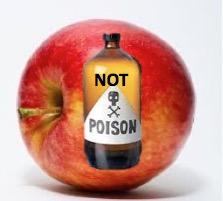
It's always the same trick. Over and over again. And it's especially useful in generating overblown or false scares: the failure to consider dose or exposure when determining risk. Certain dishonest environmental groups, such as the Natural Resources Defense Council and the Environmental Working Group, use this same trick every time they make a toxicity or carcinogenicity claim about a chemical or drug. And even though the science is terrible, the trick works quite well. By equating the presence of a chemical with its risk, those who use this trick ignores one of the fundamental tenets of pharmacology—the relationship between dose and a given effect. But without information about dosage, it is impossible to make any claim about the danger of any chemical. Nonetheless, it makes for good headlines.
Newsweek took the bait with a new article with an absurd title followed by an almost as absurd story: "Your fruit is covered with nasty pesticides: scientists have discovered the best way to wash them off." Ugh.
The author, Kate Sheridan, a science writer, should know better, but it's not entirely her fault. Ms. Sheridan was covering a silly study by Tianxi Yang and colleagues of the Departments of Food Science and Veterinary and Animal Sciences and the University of Massachusetts in Amherst. They should know better as well. Let's look at the paper.
1. The group states: "Removal of pesticide residues from fresh produce is important to reduce pesticide exposure to humans."
Problem: They are saying that removing pesticides from produce is important to reduce pesticide exposure to pesticides. Yes, removing pesticide will result in less pesticide. Duh. It doesn't say that reducing pesticides on produce will have any impact on human health whatsoever.
2. The group took organic apples, and hand washed them with purified water to remove "surface contaminants, such as dust."
Problem: This statement implies that organic apples are grown without pesticides which is false. They are simply grown with a different set of pesticides, and as my colleague, Steve Savage discussed last year in Forbes.
3. The method of application. "Thiabendazole and phosmet stock solutions of 1000 mg/L (ppm) were prepared with ultrapure water and methanol (1:1, v/v) and then diluted to 100 mg/L with ultrapure water before use...each pesticide solution was mixed with 50 μL of a 250 mg/L solution of 50 nm [gold nanoparticles] for 1 h at room temperature to ensure effective pesticide complexation "
Problem: Whoa! The pesticide solution that is applied to the apples contains methanol and gold nanoparticles, both of which enhance penetration through the apple skin. Does this method have anything to do with real life? Who knows? I don't think that this is what "golden apple" really means.
4. Rinsing off the pesticides: Baking soda (sodium bicarbonate) was found to be more effective than bleach in removing the applied pesticides from the apples.
Problem: Huh??? This sounds mega-crazy. I don't doubt that the Amherst group ran this experiment and that they recorded measurements. But do they mean anything? Any chemist would wonder what is was going on here. I could not envision a single instance where bicarbonate would be better at cleaning anything than bleach unless it was simply a matter of pH. Bicarbonate solution is mildly basic, with a pH of 9. The bleach used in the apple experiment was less basic because it was acidified (1) so that it ranged from 6.5−7.5. Still, this is a chemistry red flag. I just don't get it.
5. Finally, right near the end of the article: "Neither pesticide is clearly associated with long-term health impacts like an increased risk of cancer—certainly not at low doses."
Ah hah moment: The rest of the article is just scary fluff. This one single sentence is the essence of the story: There is no story. Pesticides on fruit are found in such low quantities that they do not pose a health threat to fruit eaters. This story is simply about decreasing the level of something that isn't dangerous in the first place, yet when a headline like "Your fruit is covered with nasty pesticides: scientists have discovered the best way to wash them off" is used, it is all but guaranteed that people will conclude that apples will harm them unless that soak them in baking soda for 15 minutes. Nonsense.
This story, which should have never been covered in the first place, is simply about the comparison of two methods of removing pesticides from apple skins, and not that there is any reason to do so. It's just scare journalism.
NOTE:
(1) Bleach out of the bottle is strongly basic. It has a pH of about 12.



